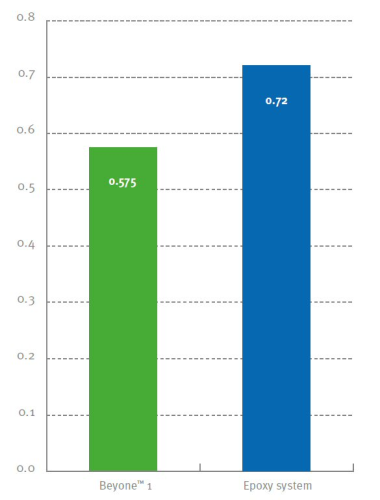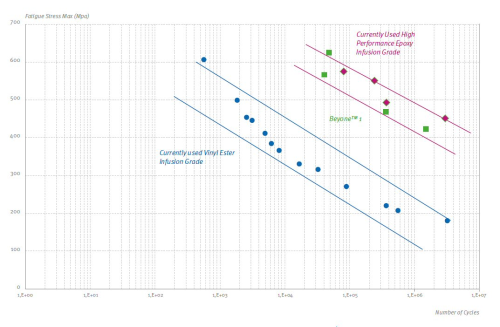

Beyone 1 resin is designed for use in the vacuum infusion processes employed in the building and construction, marine and especially the wind energy composites sectors, where it will compete with epoxy resins.
Styrene and cobalt out, renewables in
Because of the lack of styrene, Beyone 1 resin produces hardly any odour in both liquid and cured state and does not require investment in emissions and air control systems, reports DSM.
(DSM introduced the Atlac® Premium range of styrene-free resins in October 2011 in response to continuing uncertainly surrounding styrene legislation. See: DSM launches range of styrene-free resins.)
The resin is pre-accelerated and its curing system is based on the BluCure™ (cobalt-free) technology introduced by AkzoNobel and DSM Composite Resins in April 2012. Cobalt-based curing agents are currently under regulatory review in Europe. (See: AkzoNobel and DSM launch BluCure cobalt-free curing technology.)
| This new resin is 40% bio-based and also demonstrates great performance, so we believe that we are redefining the standard for the industry both in performance and sustainability: truly a Green Revolution. |
| Robert Puyenbroek, Chief Technical Officer, DSM Composite Resins |
Close to 40% of the raw materials used for Beyone 1 are derived from renewable resources, reducing its ecological footprint. DSM reports that in a comparative life cycle assessment (LCA) Beyone 1 demonstrated a lower eco-footprint than equivalent epoxy resins (see chart on right).
Performance benefits
Beyone 1 resin is reported to have low viscosity, enabling easy impregnation of glass fabrics and fast infusion. Because it is pre-accelerated, its curing can be optimised for different part designs and workshop conditions.
Parts made with Beyone 1 resin do not generally require elevated cure temperatures, reports DSM, as the resin cures at room temperature. In addition, high performance parts can be obtained with no or significantly reduced post-cure compared to competitive epoxy resins.
Laminates based on Beyone 1 have undergone fatigue tests which demonstrate an equivalent resistance level with laminates based on epoxy resins (see chart on right).
A new chemistry
| For more information about DSM’s innovation strategy for composites see the feature article New resins help meet global trends, Part 1 and Part 2. |
At a press conference during the JEC Europe 2013 trade show in Paris (12-14 March), Thomas Wegman, marketing manager for DSM Composite Resins, noted that exact chemistry of the Beyone 1 resin is proprietary at this time.
"The product is based on our second-generation styrene-free technology. We use a combination of different reactive elements and bio ingredients. I cannot give you more details than that, but clearly the resin is different from the typical chemistry."
The resin is not available for general sampling at present. DSM is currently testing it with a number of partners in different industries.
Wegman believes that the broader market introduction of the resin could potentially take place in 2014-2015.
Also see:




